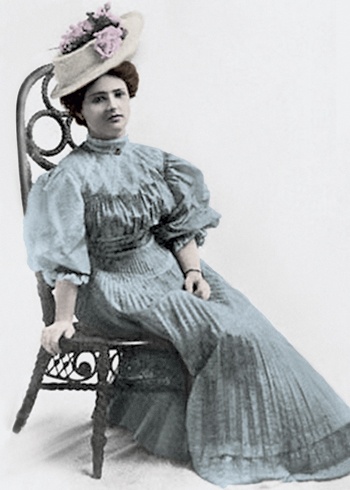In 1872, an impeccably dressed young woman sashayed along the dusty streets of Fort Griffin in North Texas. Although she looked like a cultured Southern belle with a wardrobe straight from the Paris fashion houses, the red-haired beauty, who went by the name Lottie, was one of Texas’ most notorious gamblers.
Trailed by a past clouded in mystery, the lady pushed through the batwing doors of the Bee Hive, her preferred gambling house, where she proceeded to extract the last cent from a well-to-do gentleman at a card game of faro. As the story goes, someone yelled from the back of the saloon, “Honey, with winnings like them, you ought to call yourself Lotta Dinero.” With a slight adjustment, she did.
Lottie Deno both angered and intrigued the hard-bitten men of the Texas frontier forts. Beguiling and mysterious, she handled a deck of cards with maddening dexterity, cleaning out foolish soldiers who had just drawn their pay. Most of the regulars suspected that she cheated at cards, but none could catch her at it. Previously known as Mystic Maud, the lady gambler guarded her secret past like a royal flush, causing wild rumors to circulate about her ancestry.
Few of Lottie’s contemporaries ever discovered that she was born Carlotta J. Thompkins on April 21, 1844, the daughter of well-to-do parents, on a plantation near Warsaw, Kentucky. Her father, a racehorse breeder, sent her to an Episcopal convent and took Lottie with him on business trips across the United States and Europe. But it was in New Orleans that he introduced his eldest daughter to the world of gambling, betting heavily on his horses and introducing her to the secrets of winning at cards.
Lottie’s nanny, assigned to her at birth from among the slaves who worked the Thompkins’ plantation, was a giant of a woman, 7-foot-tall Mary Poindexter. Mary accompanied Lottie everywhere, long after she grew to adulthood. When the two women walked the streets alone, Lottie’s father didn’t worry. Nobody messed with Mary Poindexter.
In 1861, when Lottie was 17, the Civil War took a disastrous toll on her family. Her father enlisted in the Confederate Army and was killed in battle. Lottie’s mother, in failing health, sent her daughter to Detroit to stay with family friends, hoping that she would marry a young man who could take over her father’s business. Lottie cavorted through the city, dancing her nights away until Mary pointed out that they would soon run out of money. Lottie received a fortuitous invitation to visit a local gambling fraternity. Dressed in her finest, she attended . . . and played.
Her nights at the poker tables provided income, enough to send money home to her mother and younger sister, although she told her family nothing about the money’s origins.
In Detroit, Lottie teamed up with old friend Johnny Golden, a former jockey who had once ridden her father’s racehorses. But Lottie’s mother made it plain that Johnny was not acceptable husband material and would not be welcome in Kentucky because he was Jewish. Throughout the Civil War, Johnny and Lottie worked the gambling houses along the Mississippi River. They ultimately split, and Johnny agreed to meet Lottie in San Antonio in the near future.
Mary, meanwhile, took her job as Lottie’s guardian seriously, once even throwing herself on a rattlesnake in her mistress’ path. Mary was bitten in the scary encounter near the Mississippi and lost a finger. In another incident, two Confederate officers spotted Lottie strolling on the deck of a riverboat. One officer began shouting that Lottie had cheated him at cards and raced up the gangplank to confront her, but Mary stepped between them, lifted the officer into the air and tossed him overboard.
In 1865, Lottie arrived in San Antonio and a year later was offered a job dealing cards at the University Club. About five years passed before Johnny put in an appearance, but by then Lottie had fallen in love with Frank Thurmond, a club owner who eventually departed for West Texas after allegedly killing a man during a card game. In time, Lottie also headed west, arriving at Fort Griffin, where she rubbed elbows with such legendary gamblers as Doc Holliday and Wyatt Earp, once winning more than $3,000 from Holliday in one evening.
After many years as a glamorous gambler, she joined Frank in New Mexico. The couple married in 1882 in Silver and moved to Deming, where Lottie gave up gambling and became a founding member of St. Luke’s Episcopal Church.
The colorful life of Lottie Deno, who died on February 9, 1934, and is buried next to her husband in Deming, reached legendary proportions when she was immortalized as the character Miss Kitty in the long-running television series “Gunsmoke.”
——————–
Martha Deeringer, frequent contributor


